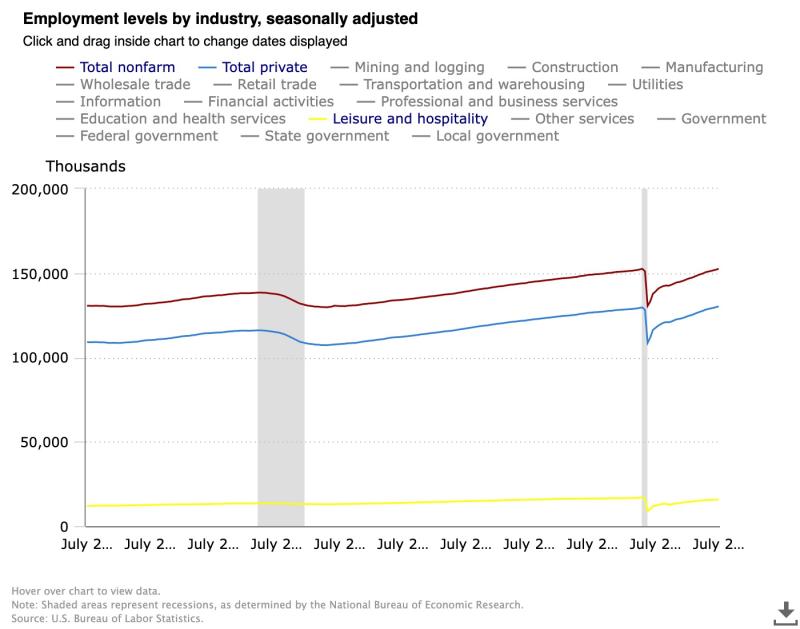The United States’ labor market added 528,000 nonfarm jobs in July, exceeding earlier expectations. According to financial website Seeking Alpha, economists had predicted nonfarm payrolls to expand by 250,000 jobs for the month, below June’s numbers.
The U.S. Bureau of Labor Statistics reported the additions were larger than the average monthly gain over the preceding four months (+388,000).
Overall job growth for the month was led by gains in leisure and hospitality, which added 96,000 jobs in total. (Food and beverage services dominated the sector, up 74,000 jobs.)
Still, the report noted that employment in leisure and hospitality is still below its February 2020 level by 1.2 million, or 7.1 percent.

Wages
According to the New York Times, wage growth climbed more quickly than economists had expected in July.
Average hourly earnings for all employees on private nonfarm payrolls rose 15 cents, or 0.5 percent, to $32.27 for the month. Over the past 12 months, average hourly earnings have increased 5.2 percent. In July, average hourly earnings of private-sector production and nonsupervisory employees rose 11 cents, or 0.4 percent, to $27.57.
Hourly earnings in the leisure and hospitality sector were $20.22 for the month, up from $18.60 the year before. Hourly wages also were up in June over May ($20.10 from $19.93).
The Times noted that the wage increases are “concerning news” for the Federal Reserve because officials are watching for signs of a sustained moderation in pay gains that could help to pave the way to lower inflation.
The Great Resignation
In July, the overall unemployment rate edged down to 3.5 percent, and the number of unemployed people dropped to 5.7 million. These numbers have returned to the levels of February 2020, before the COVID-19 pandemic.
The Washington Post noted that the number of Americans quitting their jobs remains high, although lower than its peak earlier this year. A record number of workers have left their jobs over the past year as the pandemic “afforded workers increased leverage to demand higher wages and better conditions, particularly in the leisure and hospitality sectors.” While the trend may be softening, the Post reported that resignation rates remain at a 20-year high.
While higher wages can certainly help boost retention, salaries must keep pace with inflation if they are to be meaningful. In the hospitality sector, employers have found success leveraging flexibility as an employment perk in addition to competitive wages. Elie Khoury, EVP of operations at Aimbridge Hospitality, told Hotel Management that when interviewing or hiring new workers, the existing team is scheduling around availability rather than choosing an applicant who is available when the hotel needs a worker. Rikki Boparai, VP of operations at Benchmark Hospitality, said that team members are supporting hotel housekeepers and taking on different responsibilities in order to prevent burnout.
